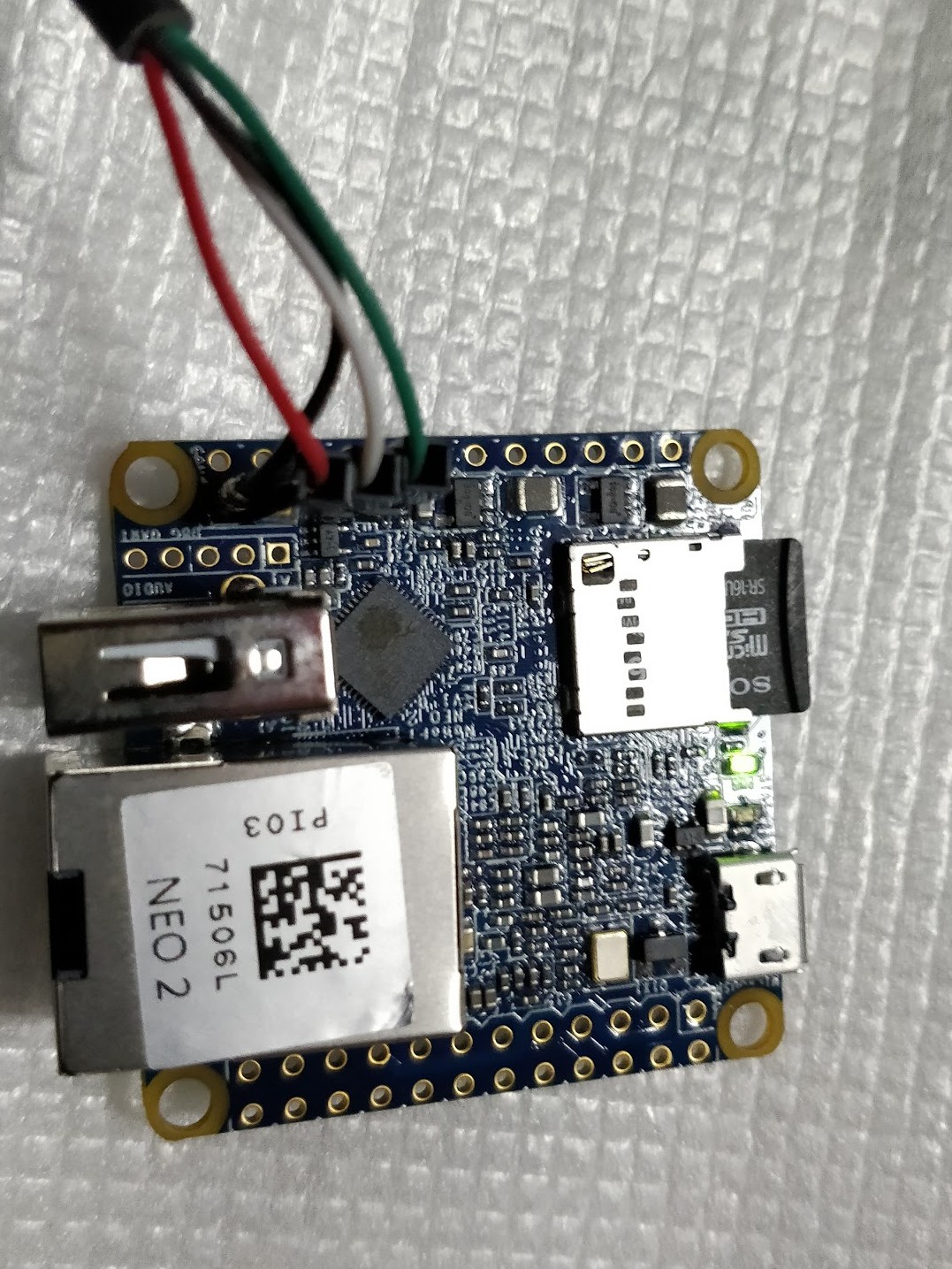FriendlyARM-NanoPi-NEO2
This tutorial will show the details of Nanopi NEO2 board mainline support and other needed details, for more information about hardware and linux-sunxi
Hardware Access

Serial debug and Power connections
BSP Build
Manual Build
Image building need host to ready with all necessary tools ready, refer here
Below are the details of Image build for Nanopi NE02 board.
ATF
$ git clone https://github.com/apritzel/arm-trusted-firmware.git
$ cd arm-trusted-firmware
$ make PLAT=sun50iw1p1 bl31
$ export BL31=/path/to/arm-trusted-firmware/build/sun50iw1p1/release/bl31.bin
U-Boot
$ git clone git://git.denx.de/u-boot.git
$ cd u-boot
$ make nanopi_neo2_defconfig
$ make
Linux
$ git clone git://git.kernel.org/pub/scm/linux/kernel/git/next/linux-next.git
$ cd linux-next
$ make mrproper
$ ARCH=arm64 make defconfig
$ ARCH=arm64 make -j 4 Image dtbs
Buildroot
It’s easy to build entire system using buildroot and mainline supported nanopi-neo2 already. See read this readme.txt for more info.
$ git clone git://git.busybox.net/buildroot
$ cd buildroot
$ make friendlyarm_nanopi_neo2_defconfig
$ make
Booting
SD Boot
U-Boot
USB Mass Storage gadget
We can use the board as a USB Mass Storage device:
You will be able to access all the partitions of any block device that is on the board or connected to it,
from your host PC - You will see them as /dev/sdXX, just like connecting a regular USB storage to your PC,
and you’ll be able to mount them, and have full read/write access to them.
We can even use it to flash a new U-Boot, re-partition the storage, re-format it, etc.
This is especially useful for updating the internal eMMC.
To do this you need to connect a USB cable between the OTG/Client port of the board and a regular USB Host port on your PC,
and use U-Boot’s ums command.
Linux
USB Mass Storage gadget
Build otg mass storage as statically linked module with
CONFIG_USB_GADGET_LEGACY=y
CONFIG_USB_MASS_STORAGE=y
Append bootargs with ‘g_mass_storage.removable=1 g_mass_storage.luns=1’
[ 1.676222] usb_phy_generic usb_phy_generic.0.auto: usb_phy_generic.0.auto supply vcc not found, using dummy regulator
[ 1.687279] musb-hdrc musb-hdrc.1.auto: MUSB HDRC host driver
[ 1.693023] musb-hdrc musb-hdrc.1.auto: new USB bus registered, assigned bus number 9
[ 1.701483] hub 9-0:1.0: USB hub found
[ 1.705290] hub 9-0:1.0: 1 port detected
[ 1.709841] Mass Storage Function, version: 2009/09/11
[ 1.715010] LUN: removable file: (no medium)
[ 1.719330] LUN: removable file: (no medium)
[ 1.723613] Number of LUNs=1
[ 1.726619] g_mass_storage gadget: Mass Storage Gadget, version: 2009/09/11
[ 1.733592] g_mass_storage gadget: userspace failed to provide iSerialNumber
[ 1.740629] g_mass_storage gadget: g_mass_storage ready
# cat /proc/cmdline
console=ttyS0,115200 earlyprintk root=/dev/mmcblk0p1 rootwait g_mass_storage.removable=1 g_mass_storage.luns=1
# fdisk -l
Disk /dev/mmcblk0: 15 GB, 15931539456 bytes, 31116288 sectors
486192 cylinders, 4 heads, 16 sectors/track
Units: cylinders of 64 * 512 = 32768 bytes
Device Boot StartCHS EndCHS StartLBA EndLBA Sectors Size Id Type
/dev/mmcblk0p1 320,0,1 815,3,16 20480 31116287 31095808 14.8G 83 Linux
# echo /dev/mmcblk0 > /sys/devices/platform/soc/1c19000.usb/musb-hdrc.1.auto/gadget/lun0/file
Access the disk and write and umount